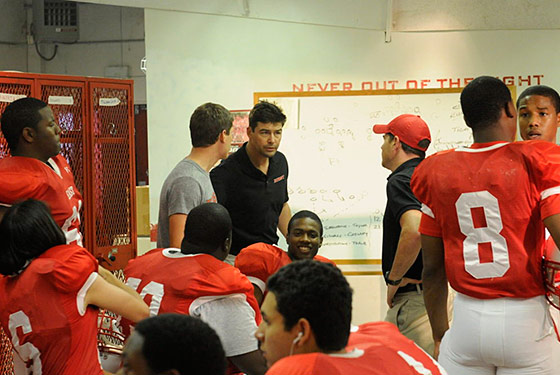
Friday Night Lights returns tonight on DirecTV for its fifth and final season, after leaving us in tears of both sadness and joy after its season-four finale. On the bummer side of things, longtime bad boy Tim Riggins headed off to jail, taking the rap for his brother. On the invigorating side, our heroes, the East Dillon Lions, won an improbable victory over evil crosstown rivals and superior football team, the West Dillon Panthers. That’s the way it usually goes on this show: on-the-field Hollywood uplift triumphs paired with off-the-field realistic downers. With this fifth and final season, will we get a happy ending for our people and our football team? Or would that not be Friday Night Lights?
The show has never been that realistic about winning. In its first season, the team awesomely won the state championship, even though their star quarterback had been paralyzed and their top running back was suspended for much of the season. Yes, they lost in season three, but that was after winning enough games to make it back to the finals. (Season two got a little away from football, busying itself with Landry and his rapist-killing hobby.) Last year, when Coach Taylor was forced to go to East Dillon and start a football program from scratch, his team did lose — up until the all-important last game of the season, when his 1–7 Lions eked out a glorious and moral victory over his former team, the Panthers. With that one win the Lions turned their fate around: [Mild spoiler alert.] In the new season, the Lions are not a losing football team.
It’s not that we’re complaining about all this winning: We cheered along with every victory. It’s just that the football win-loss record is so much better than the personal-problem win-loss record. While Tammy and Eric, the series’ primary couple, have remained inviolably, lovingly, realistically intact, the kids around them experience no such consistency. Riggins constantly floats the idea of respectability, only to have that possibility punted off into the horizon every time. And the teen romances between Jason and Lyla, Lyla and Tim, Julie and Matt, Landry and Tyra, and Landry and Jess all ended.
When it comes to its characters, FNL takes a parental perspective: This might hurt now, but it’s for the best. And that’s the satisfaction that viewers get, too: Though our short-term Jaracen (Saracen + Julie, duh) loving hearts wish everyone would get married and settle in Dillon and meet at the Alamo Freeze every Friday after the game, we must regretfully concede that such kowtowing to romantic clichés would make this a different show, and not nearly as good of one. (Which isn’t to say that we’re still not happy for the occasional Hail Mary plot resolution: Smash getting to play for a college team even after busting his knee made us cry so hard, we don’t care how implausible it was.)
To bring that realism over to the scoreboard, sometimes the Coach’s team would have to have a great season, but often it would just be mediocre: a 5–4 record, eliminated in the regionals. That might be more realistic, but would it be as satisfying? Friday Night Lights, purveyor of clear eyes and full hearts, knows the power of clichés: They contain some truth, and give comfort. (Think of Tammy telling Jason Street in the first season, “There’s no weakness in forgiveness,” which in context isn’t lazy writing, just something a guidance counselor would say to a teenage boy — albeit one who looked like a 30-year-old — whose girlfriend had cheated on him.) Maybe all the last-minute touchdowns and suspenseful trips are just another well-deployed cliché, a comfort that balances out the show’s darker notes, for both the characters and the viewer. So, this season, look for the Lions to make state. No happy promises about anything else.




